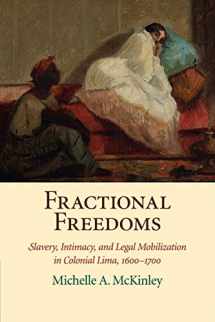
Fractional Freedoms: Slavery, Intimacy, and Legal Mobilization in Colonial Lima, 1600–1700 (Studies in Legal History)
Book details
Summary
Description
Fractional Freedoms explores how thousands of slaves in colonial Peru were able to secure their freedom, keep their families intact, negotiate lower self-purchase prices, and arrange transfers of ownership by filing legal claims. Through extensive archival research, Michelle A. McKinley excavates the experiences of enslaved women whose historical footprint is barely visible in the official record. She complicates the way we think about life under slavery and demonstrates the degree to which slaves were able to exercise their own agency, despite being ensnared by the Atlantic slave trade. Enslaved women are situated as legal actors who had overlapping identities as wives, mothers, mistresses, wet-nurses and day-wage domestics, and these experiences within the urban working environment are shown to condition their identities as slaves. Although the outcomes of their lawsuits varied, Fractional Freedoms demonstrates how enslaved women used channels of affection and intimacy to press for liberty and prevent the generational transmission of enslavement to their children.


We would LOVE it if you could help us and other readers by reviewing the book
Book review



